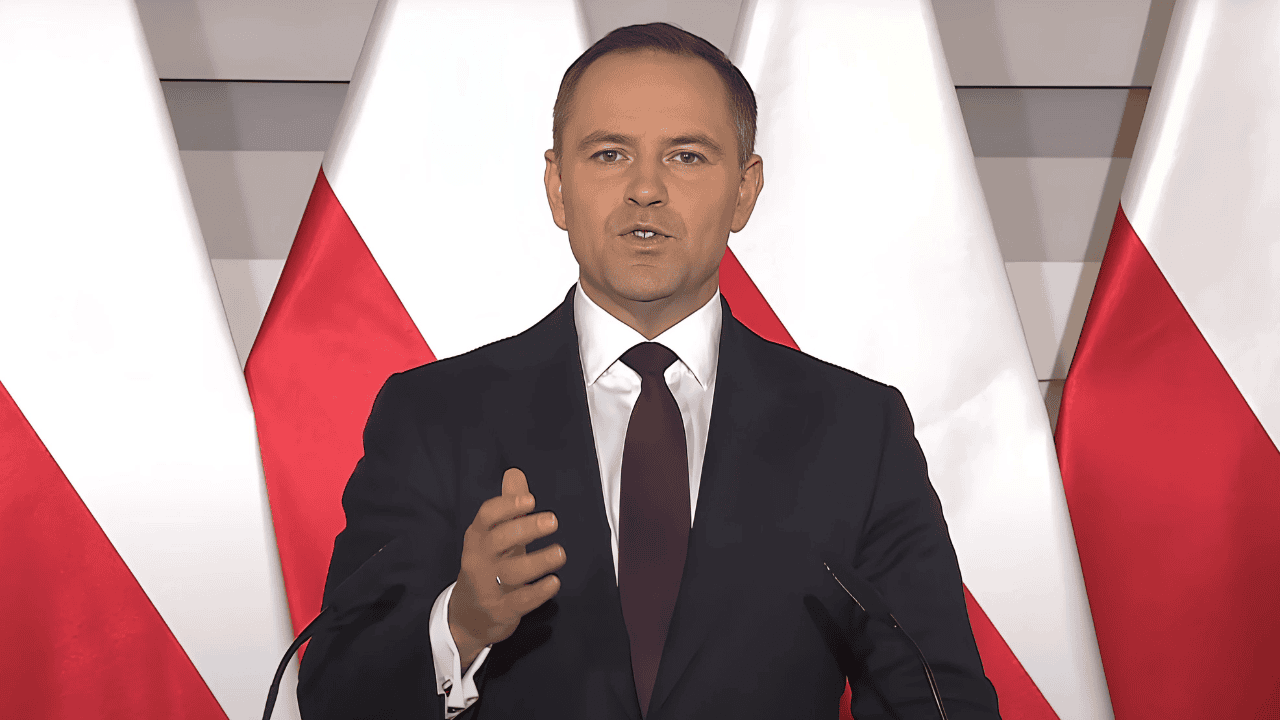Marek Dyżewski: "PENOMEN WOJCIECH KILAR "
date:16 July 2014 Editor: GKut
Wojciech KilarMarek Dyżewski
On July 17, 1932, Wojciech Kilar was born - Grand Patriot, Grand Composer, Knight of the Order of the White Eagle.

photo by Zdzisław Sowiński
We're like a lecture. Marek Dyzhewski "PENOMEN WARKILARA."
The lecture was given at the office of the Association of Polish Journalists at 3/5 Foksal Street in Warsaw on 21 June 2014.
Wojciech Kilar belongs to the ellipse of creators, whom I see as a peculiar "gift of history".
The war annihilated our artistic elites, but fortunately, we were given to people who had at least part to compensate for their losses. These people made Poland the home of art of global importance. 1 of them is just Wojciech Kilar. 1 of them – Henryk Mikołaj Górecki and Krzysztof Penderecki appeared with him. Pointing to the year of their birth, they talk about the generation 1932-1933. They were respective years old erstwhile the war broke out, the war apocalypse was seen in a heightened dimension – with the eyes of kid sensitivity. The second half of the 1950s was for them a period of survey and primaries of their symphony, concerts, sonata. After 20 years, they appeared in the planet audience of contemporary music, which was the global festival of this music "Warsaw Autumn". In 1959, 60, 61, 62 they shaped the speech of this festival. They created the canon of modernity in music, defined fresh laws of musical beauty, transformed the very concept of music.
Górecki – Penderecki – Kilar. They were referred to as “Polish schools”. Although their goal was not to separate themselves from what was the cry of fashion in Europe. On the contrary, they wanted to catch up with Europe. They grew up fast. They absorbed the musical thought of Vienna's masters: Schönberg and Webern, the ideas of their French students – Boulevard, Xenakis. They went to Darmstadt to survey – avant-garde mecca. They wanted to catch up with the European lead, but they became the subject of admiration. Young Poles, as Gombrowicz would have said, brought their own “maturity” into Darmstadian music, speculative music, ruled by reason. In fact, they brought the surviving fire of art. The voice of the intellect was linked to the heart. Modernity of sound language? Yeah. But also: emotion, the power of expression, the power to influence the imagination of the listener.
How does today, from the position of forty years, the music of this "storm and force period", a period whose top evidence is the Collision of Henryk Górecki, Tren and Polymorphia of Krzysztof Penderecki, Diphthongos and Riff Wojciech Kilar? It must be admitted that fewer works of this period have endured the test of time. Most of them, as Wojciech Kilar says, constitute the “great cemetery of scores”. A cemetery of works that died immediately after the first work, due to the fact that they could not answer the question: why and for whom they were created.
If something in art is great, it cannot be for many, and if it is for many, it cannot be great. In these words, Arnold Schönberg sought comfort from many of the creators of fresh music, from which listeners turned. Wojciech Kilar did not request specified comfort. He believes that the value of music and its social scope do not should be excluded. He even thinks that this social scope should be a test of the value of the work. Wojciech Kilar, in a conversation with Leszek Polonym and Kladia Podobinińska, clearly says: “The works that performers want to play are truly valuable, and the audience – listen.” (I enjoy the gift of life. Talk to Wojciech Kilar. Claudia Podobinski and Leszek Polony. PWM 1997, p.30).
And specified works Wojciech Kilar gave Polish music. They are the decoration of performance programs and festivals, and they are gladly returned to them by orchestras, choirs, conductors and listeners. Their attractiveness, with each gathering with them, does not diminish, but increases significantly.

Photo by Zdzisław Sowiński
World fame was brought to Kilar by movie music. Kilarowski's achievements in movie music are huge. 120 films can be exchanged: Zanussi, Wajda, Kutz, Kieślowski, Polanski and abroad artists.
Who knows if it's not movie images, Kilar's imagination has the most to thank. Kilar amazes with a variety of ways of referring to what is happening on the screen. erstwhile gives a discreet metaphysical commentary, and erstwhile essential – baroque sound image. He can express what remains inexpressible for the image. He can make music from which the imagination of the movie emerges.
The movie is simply a possessive element. He wants to catch the composer. Kilar experiences it more than once. It remains in the movie ellipse daemonion even erstwhile it leaves the movie atelier. She's inactive reasoning about the movie. He makes movie music without film. She makes music that is simply a movie herself. Or a painting. It creates music, which is simply a soundscape. Isn't chairing a scenery like this?
Wojciech Kilar loves mountains. He loves hiking in the Tatras. It was there, in the Tatra scenery and in the music of the Tatra mountaineers, which winged the imagination of many Polish music, that found a valuable origin of inspiration. Orawa, ecclesiastical, Siwa fog and Krzesany – in these works Kilar follows the voice of the Tatras. A mountain myth? Yes, the composer is delicate to that. But he besides has much to thank the musicians of the Highland bands. He found his masters in them. He learned from them the simplicity, the elementaryness of the musical language, learned the rhythm giving the music life and power, learned the trance in the instrument in which the musician introduces authentic improvisation.
Kilar's music has a large power of imagination. Not just the listeners. besides artists. 3 Kilarian sacral works by Bogomoc, Angelus and Exodus were reflected in choreographic visions that Ewa Wycichowska created with Poznań Dance Theatre. In the mediate Ages it was said that art is “the mirror of history”. I mention this due to the fact that it is the story, which happens before our eyes, that Polish past is viewed in these works.

Photo by Zdzisław Sowiński.
God-parent. An old Polish song about God's Parent. A song that was our first carmen patriae, the first anthem. Bogarodnica is besides the title of Kilar's work, composed in 1975. It is different from the majestic choral song sung in the mediate Ages. Started with a verbel sound, dominated by a hard rhythm, with a chorus that chants the words of the song, sounds like a shrewd horse.
There is strength and power in the God-parents of Kilarov. “We request specified a God-parent today,” said Kilar at the time of our apathy, (remember, it is 1975), at the time of the greyish of real socialism, at a time of hopelessness, erstwhile we believed that this must always be as it is. The prophetic speech of this work. Just 4 years later, Pope John Paul II called 3 million pilgrims in Krakow Błonie on his first journey to Poland: You must be strong! You must search spiritual power with Him in whom so many generations of our fathers and mothers found it (10.06.1979).
1982-84. Wartime. This night was radiated by Kilarowski Angelus, a sacral work of exceptional measurement created by the inspiration of OO. Paulinów on Jasna Góra. A work that is another Polish call to God-parent. This time with the words which the angel greeted Mary in Nazareth: Ave Maria, gratia plena – Hail Mary, full of grace. large words. In them begins the communicative of man's salvation. The minute of the Savior's conception is not inscribed. Those words are recited by the choir. Reciting once, twice, fifth, tenth. Like in litany or – in the rosary. Repeating – the rule of prayer – here becomes the rule of music. due to the fact that erstwhile music emerges from the recited word, it will stone us with a fewer sound singing repeated with tenacity and ardentness. This song will grow in its strength to detonate with all the power in the word JESUS. And then – it will expire, quiet down, melt in the recitation of the prayer itself.
And the 3rd sacral work by Wojciech Kilar – Exodus. It was created between 1979 and 1981. It was a peculiar time for us Poles. The Pope for the first time in Poland, the beginning of our “beating on independence”. And solidarity. This time determined the symbolism of the work. It refers to the Bible book of Exodus. The Israelites recovered from Egyptian captivity, crossed the Red Sea, and sang to the glory of the Lord. This is the message of the work by Kilar: Poles besides have their exodus, their passage through the symbolically understood "red sea".
When it comes to sound substance itself, Kilarowski Exodus grows out of the Hebrew spiritual melody, constantly repeated here. Ravel's “Bolero” comes to mind. due to the fact that it is indeed a Kilarowska consequence to Ravelowski's idea. The thought of repeating the same melody over and over again, in an increasingly dense and massive sound garment. The form of the work grows and grows in monumental crescendo to scope its sound peak. But note: Ravel's is simply a long melody, and Kilar's is an highly simple, lapidary, only seven-sonic formula.
When the orchestra's game reaches its climax, they shine the words of the choir: Ecce venit populus tuus, Domine! Here comes your people, Lord! And besides Hosanna and Hallelujah. But how hot is that singing! Hallelujah – the most crucial word of Christian liturgy – means Glory to him who is. And glory must be expressed with joy! due to the fact that – as St Augustine taught – if there is no joy, there is no glory. King David, singing Hallelujah, was spinning in the dance, jumping up, clapping his hands and shouting aloud.
Here, for a moment, let us decision distant from the ecstatic music of this work and ask ourselves: what happened to our religion, that present in our chants for the glory of the Lord there is no specified joy?
Yet the psalmist teaches:
Sing with joy, all you righteous hearts. (Ps. 32)
Jubilee domino omnis terra,
servite Domino in laetitia,
introite in conspectu eius in experimente. (Ps. 100)
Everyone who walks on earth,
In honor of the Lord, you cry out joyfully,
Serve him in joy and willingly,
And visit His church with gold (J. Kochanowski).
When it comes to joy, you can scope to the Psalm verses forever. 15 Psalms closing the Book of Psalms is 1 large apology of joy.
Isaiah says: (12.3):
You will be happy to draw water from the Savior's cures.
God calls Jerusalem “a city full of weddings.”
In Jesus' own words, joy is considered a companion of life, a way of life--here on earth. In the last speech to the apostles, just before the ascension, Jesus speaks of joy: This is what I have told you, that my joy may be in you, and that joy may be full (John 15:11).
Let us return to the question: why is this note of joy missing from the hymns sung for the glory of the Ancient? possibly prof. Stefan Swieżawski is right, claiming that present we have lost the sense of a miracle that is constantly happening around us. And from this amazement of the miracle of creation, of these fundamental questions: Why is there more than nothing? Why is there a existence if it might not be? Why is this world? Why am I? – out of these questions comes philosophy. And they make the religion blush. Out of amazement over the miracle of creation, out of gratitude for creation, comes joy in the heart, which outside will shoot an anthem for the glory of THE 1 WHO IS AND who gives life to others.
And it is this forgotten, long-lost note of spiritual joy that Wojciech Kilar reminds us of in the temples and composition workshops. It's like Exodus. And it reminds Gloria of the latest sacred work: Missa pro pace.
Cantate Domino canticum novum – Sing the Lord a fresh song (Ps. 96). Yes, next to the song sung since the old days, a fresh song is needed. A song that each generation will translate the message of the Good News into the language of its time, its sensitivity, its spirituality.
Wojciech Kilar fulfills the psalmist’s command. He sings a fresh song to people today. Nobody like him can tune this song into the soul of contemporary Poles. Therefore, nothing more accurately summarizes the atmosphere of Polish religion than the Kilarowski Angelus.
I remember performing this song at the Wratislavia Cantans Festival (5.09.1986). erstwhile the last chord was vibrating in the Cathedral of Mary Magdalene, applause and cheers of the delighted audience broke. The cathedral was excited for respective minutes. For the warm reception, Wojciech Kilar thanked his listeners respective times, bowing down. Finally, he approached the conductor's desktop, took the score of the work and pointed it up—to heaven. With this eloquent gesture, he showed us who should be grateful for the song that moved us so much. It is the 1 who gave the composer talent, the 1 who in all creative effort supported him with the gifts of the Holy Spirit, the 1 who alone is the origin of all Beauty, and who, in the works of the creators surviving next to us, allows us to feel the taste of Beauty, which is not of this world.
So thank God that Wojciech Kilar lived among us. That his music inactive helps us to better realize and experience the Good News. And that He shows us the way to Good and fact to His beautiful works.
Marek Dyżewski
From the laudation to WOJCIECH KILAR by MARK DYŻEWSKI on the occasion of the bestowal of the Master of BETLEJSKI MEN (Poznań, St.









![Sąd: Mieszkanie 191.500 zł. Zachowki 31.916,66 zł i 10.638,88 zł. Obliczenia. Wzory [Przykład]](https://g.infor.pl/p/_files/38265000/podwyzki-38264590.jpg)







